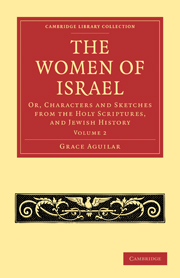Summary
Having thus briefly glanced over the real origin, intent, and meaning of the Talmudic Ordinances, we will return to the point whence we started, and ascertain whether or not our venerable sages so completely contradicted the spirit of the law of Moses, as to hint, countenance, or ordain the degradation of the Hebrew female. For this purpose, we will transcribe a few of the rabbinical maxims, with which we have been favoured by the kindness of the friend already referred to, whose sound knowledge of the Hebrew, both Biblical and Talmudical, and deep research, render his information on the subject indeed invaluable. The Hebrew Review, and one or two other casual notices in divine history, have also enabled us to form an opinion: but the Talmud itself should be its foundation; and from that we, as a female, are unhappily debarred.
We must refer once more, though unwillingly, to the Nazarene assertion, that their religion was the first, and is the only one, which provides for women. “For woman never would, and never could have risen to her present station in the social system, had it not been for the dignity with which Christianity invested those qualities, peculiarly her own, etc. We can quite understand and sympathise in the Christian woman's love for her own faith, and heartfelt eloquence in the privileges it assures her.
- Type
- Chapter
- Information
- The Women of IsraelOr, Characters and Sketches from the Holy Scriptures, and Jewish History, pp. 421 - 440Publisher: Cambridge University PressPrint publication year: 2010First published in: 1845



